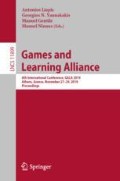Abstract
This paper examines non-formal and informal learning practices for science learning. Through a case study and an exploratory, qualitative approach we identify aspects involved such as the content, the goals, the pedagogical approaches, the settings, the role of fun and playfulness, challenges, and the role of the practitioner. Data was collected through interviews and a survey. Despite the diversity in the format, settings, structure, and target group of the practices examined in this study, there seems to be a convergence in certain themes such as the objectives of the practices, the pedagogical approaches involved, and the importance of fun. These aspects are linked with the design and implementation of digital games in the context of informal and non-formal science learning. Further issues emerged from the analysis such as gender representation, resources required for efficient implementation of practices, and the role of the parents. Strengthening the links between formal and informal or non-formal science learning practices could benefit not only formal education but access of students to and effectiveness of non-formal and informal practices as well.
Access this chapter
Tax calculation will be finalised at checkout
Purchases are for personal use only
Notes
References
Biles, M.: Leveraging insights from mainstream gameplay to inform STEM game design: great idea, but what comes next? Cult. Stud. Sci. Educ. 7(4), 903–908 (2012)
Bricker, L.A., Bell, P.: “GodMode is his video game name”: situating learning and identity in structures of social practice. Cult. Stud. Sci. Educ. 7(4), 883–902 (2012)
Jeremiassen, K.S.: Differences in students’ stem identity, game play motivations, and game preferences. Doctoral Dissertation, University of Houston-Clear Lake (2018)
Mayo, M.J.: Video games: a route to large-scale stem education? Science 323(5910), 79–82 (2009)
Williamson, B., Facer, K.: More than “just a game”: the implications for schools of children’s computer games communities. Educ. Commun. Inform. 4, 255–270 (2004)
Ito, M.: Sociocultural contexts of game-based learning. The National Academies of Sciences, Engineering, Medicine. Paper presented at the workshop for the National Academy of Science’s Committee on Learning Science: Computer Games, Simulations, and Education (2009)
Fowler, A.: Informal STEM learning in game jams, hackathons and game creation events. In: Proceedings of the International Conference on Game Jams, Hackathons, and Game Creation Events, New York, NY, USA, pp. 38–41 (2016)
Arya, A., Chastine, J., Preston, J., Fowler, A.: An international study on learning and process choices in the global game jam. IJGBL 3(4), 27–46 (2013)
Squire, K., Patterson, N.: Games and simulations in informal science education. The National Academies of Sciences, Engineering, Medicine, Washington, DC, Paper commissioned for the National Research Council Workshop on Gaming and Simulations, October 2009
Eshach, H.: Bridging in-school and out-of-school learning: formal, non-formal, and informal education. J. Sci. Educ. Technol. 16(2), 171–190 (2007)
Tisza, G., et al.: The role of age and gender on implementing informal and non-formal science learning activities for children. In: Proceedings of the FabLearn Europe 2019 Conference, New York, NY, USA, pp. 10:1–10:9 (2019)
Falk, J.H., Hall, W.: Understanding the informal science education landscape: an exploratory study. Public Underst. Sci. 21(7), 865–874 (2012)
Honey, M., Hilton, M.L.: Learning Science Through Computer Games and Simulations. National Academies Press, Washington (2011)
Shaffer, D.W.: Epistemic frames for epistemic games. Comput. Educ. 46(3), 223–234 (2006)
Saldaña, J.: The Coding Manual for Qualitative Researchers. Sage Publications Ltd., London (2009)
Patton, M.Q.: Qualitative Research and Evaluation Methods, 3rd edn. Sage Publications, Thousand Oaks (2002)
Allen, S., Peterman, K.: Evaluating informal STEM education: issues and challenges in context. New Direct. Eval. 2019(161), 17–33 (2019)
Feinstein, N.: Salvaging science literacy. Sci. Educ. 95(1), 168–185 (2011)
Acknowledgments
The authors wish to thank the participants in the survey and interviews, the COMnPLAY project partners, and our colleagues Jasper Schellekens and Anonios Liapis who collaborated with us for conducting this study and with comments on this manuscript. This work was supported by the EU funded Horizon 2020 project COMnPLAY Science.
Author information
Authors and Affiliations
Corresponding author
Editor information
Editors and Affiliations
Rights and permissions
Copyright information
© 2019 Springer Nature Switzerland AG
About this paper
Cite this paper
Voulgari, I., Yannakakis, G.N. (2019). Digital Games in Non-formal and Informal Learning Practices for Science Learning: A Case Study. In: Liapis, A., Yannakakis, G., Gentile, M., Ninaus, M. (eds) Games and Learning Alliance. GALA 2019. Lecture Notes in Computer Science(), vol 11899. Springer, Cham. https://doi.org/10.1007/978-3-030-34350-7_52
Download citation
DOI: https://doi.org/10.1007/978-3-030-34350-7_52
Published:
Publisher Name: Springer, Cham
Print ISBN: 978-3-030-34349-1
Online ISBN: 978-3-030-34350-7
eBook Packages: Computer ScienceComputer Science (R0)

